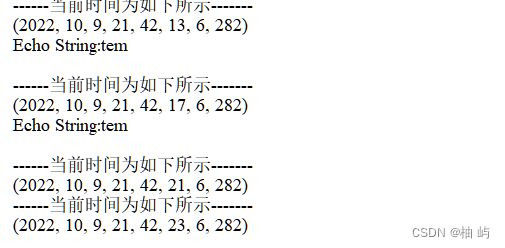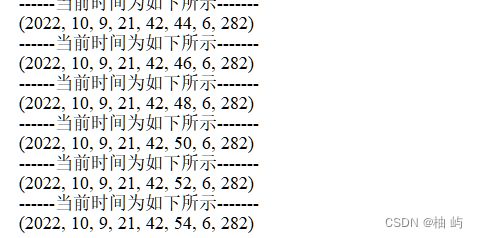- 51单片机教程(十一)- 单片机定时器
ITB业生
C单片机51单片机
11、单片机定时器项目目标通过定时器/计数器实现流水灯控制。知识要点定时器的结构。TMOD和TCON;定时/计数器工作方式;定时/计数器编程步骤;1、项目分析前面的流水灯的时间控制通过空循环语句来实现,定时不是很精确。本章通过用定时器来控制流水灯任务可以实现精确的时间控制。这就需要了解定时器的使用。定时器和计数器实质功能相同,本章利用LED灯二进制计数任务来掌握计数器的使用。2、技术准备1背景从软
- 万年历单片机c语言程序,51单片机c语言电子万年历完整程序.pdf
叶居居
万年历单片机c语言程序
该程序为51单片机c语言电子万年历#include"reg52.h"//#include#defineucharunsignedchar#defineuintunsignedintsbitlcden=P3^4;sbitlcdrs=P3^5;sbitDATA=P0^7;sbitRST=P0^5;sbitSCLK=P0^6;sbitmenu=P3^0;//菜单sbitadd=P3^1;//加一sbit
- 单片机菜单-菜单数据结构
努力努力就能上天吖!
《随手笔记》《单片机应用》单片机数据结构嵌入式硬件
在单片机中如果需要一个可以便于维护的菜单程序,那么设计一个便于封装的菜单数据结构就是必不可少的了。最近观看B站UP主有手也不会发布的视频后,发现其写的菜单数据结构尤为好用,这里用于记录,有误之处还望大家指正!按键采用Multibutton开源框架有兴趣可去GitHub上搜索,也可私信我,我发源码。structMenuItem{unsignedcharmenu_cnt;//当前菜单项目总数unsig
- 单片机菜单
路过羊圈的狼
单片机stm32嵌入式硬件
单片机菜单结构设计单片机:STM32F030F4@48MHz开发环境:keil+stm32cubemx显示屏:LCD12864一、准备工作:1、按键功能正常本例用了3个按键,上按键=切换菜单里面的项目;中按键=执行菜单里面的项目;下按键=退出执行的项目,或返回上一级菜单;2、液晶屏显示驱动正常二、构建目录结构1、例程目录结构如下:图中只有子菜单1里面写了执行程序。2、构建目录/*声明功能函数*/v
- 基于单片机的LCD菜单设计
卖水果的
工业控制常用算法单片机界面设计
在小型的单片机设备中,需要使用LCD菜单进行人机交互。对于这种交互的实现,一来无需像在手机上做APP一样,做出花哨的界面效果;二来这种小设备也不支持那样太消耗资源的界面系统。所以这种场合下,需要我们亲自使用C语言去编写一套精简的界面框架代码。定义菜单项的数据类型一个菜单项,有自身的唯一标志码ID,和显示的字符串ItemDisplayStr,和选中它时执行的函数ItemFun。但仅仅这样还不够,因为
- 基于51单片机开发多功能菜单系统项目介绍(开源)
菜鸟—历险记
51单片机嵌入式硬件单片机
51单片机多功能菜单系统一、项目介绍基于51单片机开发的多功能菜单系统是一种集成多种功能的嵌入式系统,广泛应用于电子产品中,该系统的核心是AT89C52芯片,其强大的处理能力和丰富的外设接口使其成为许多项目的理想选择。这是一个有趣且实用的项目,可以帮助用户实现多种功能,我设计了的功能有:矩阵键盘输入密码、PWM直流电机驱动风扇调速、DS18B20温度监控、光敏电阻检测模块、加减乘除计算器、人的BM
- 基于 52 单片机电子智能手环导盲杖
欧振芳
单片机
在深入学习《单片机技术及应用》课程后,我尝试运用所学知识构建了基于52单片机的电子智能手环导盲杖系统,旨在为视障人士提供更安全便捷的出行辅助,在此与大家分享这一项目的开发历程。一、系统整体架构该系统主要由智能手环和导盲杖两部分组成,通过蓝牙模块实现数据交互与协同工作。智能手环佩戴于使用者手腕,用于监测人体运动状态和生理参数;导盲杖则负责探测周围环境信息,并依据这些信息为使用者提供导航和障碍物预警。
- 基于 52 单片机电子智能手环导盲杖
在《单片机技术及应用》课程的学习过程中,我深入研究了基于52单片机的电子智能手环导盲杖的设计与开发,在此与大家分享这一有趣且实用的项目。一、系统整体架构该电子智能手环导盲杖系统主要由智能手环和导盲杖两部分组成,二者通过蓝牙模块进行通信。智能手环佩戴在使用者手腕上,用于感知使用者的运动姿态并提供心率监测等功能;导盲杖则负责探测周围环境信息并为使用者提供语音导航和位置追踪等服务。二、智能手环设计智能手
- 【Rust】——使用消息在线程之间传递数据
Y小夜
Rust(官方文档重点总结)rust开发语言后端
博主现有专栏:C51单片机(STC89C516),c语言,c++,离散数学,算法设计与分析,数据结构,Python,Java基础,MySQL,linux,基于HTML5的网页设计及应用,Rust(官方文档重点总结),jQuery,前端vue.js,Javaweb开发,Python机器学习等主页链接:Y小夜-CSDN博客目录信道与所有权转移发送多个值并观察接收者的等待通过克隆发送者来创建多个生产者学
- 51单片机基础与应用实例解析
大数据无毛兽
本文还有配套的精品资源,点击获取简介:本课程设计项目专注于51单片机的基础知识和应用实践,适合初学者。51单片机是微控制器的经典代表,广泛应用于教育和工业等领域。项目通过20个实例,涵盖C语言编程、单片机内部结构、I/O操作、定时器和计数器、中断系统、串行通信、晶振和复位电路、编程和调试、实验板使用以及项目实现等多个关键知识点,帮助学生掌握单片机的编程和应用技能,并将理论知识转化为实际操作能力。1
- 【毕设-基于STM32单片机的宠物/老人/电子围栏防丢失系统设计】
单片机辅导
毕业设计stm32毕业设计单片机宠物毕设课程设计嵌入式硬件
设计题目:基于STM32单片机的宠物/老人/电子围栏防丢失系统设计有需要请看演示视频主页介绍设计题目:基于STM32单片机的宠物/老人/电子围栏防丢失系统设计1.设计功能介绍2.作品演示介绍3.系统电路介绍4.程序流程介绍5.手机APP介绍6.设计交付介绍6.1题目选择6.2开题答辩6.3实物制作6.4论文撰写6.5毕业答辩1.设计功能介绍GPS定位功能:通过集成的GPS模块,系统能够实时获取宠物
- STM32[笔记]--2.初识单片机
2初识单片机2.1什么是单片机身边单片机案例共享单车门禁系统打卡机(指纹打卡,扫码打卡)快递柜航空航天。。。。。。单片机(Single-ChipMicrocomputer)单片机微型计算机(单片机不是一个CPU,而是一个微型计算机),是一种集成电路芯片,把具有数据处理的中央处理器CPU,随机存储器RAM,闪存flash,多种i/o口和中断系统,定时器/计数器等功能(可能还包括显示驱动电路,脉宽调制
- STM32[笔记]--4.嵌入式硬件基础
wind_one1
STM32入门教程stm32嵌入式硬件笔记
4.嵌入式硬件基础4.1认识上官二号开发板主控芯片:STM32F103C8T6高速晶振:8M低速晶振:32.768kLED:5颗KEY:3个主控芯片内部的资源如下项目介绍内核Cortex-M3Flsah64K*8bitSRAM20K*8bitGPIO37个GPIO,分别为PA0-PB15,PC13-PC15,PD0-PD1ADC2个12bitADC合计12了通道,外部通道:PA0到PA7+PB0到
- 单片机3种按键程序消抖方法
正旺单片机
51单片机单片机嵌入式硬件c语言
1,查询法延时模式u8key0=1;u8x=0;KEY=1;while(1){if(KEY==0)//"按键按下"{delay(10);//延时10msif(KEY==0&&kdy0==1)//按下有10ms且上状态是1。即下降沿时{key0=0;//将上状态置0.防止按住不放时,重复执行按下程序语句。x++;//按下执行语句}key0=KEY;//弹起按键时将上一状态置1.否则保持为0.}P0=
- 单片机裸机中的非阻塞延时:任务分离计数器法实战
代码与烙铁
单片机编程单片机嵌入式硬件c语言
在裸机编程中,我们常常需要定时执行一些任务,比如让LED以固定频率闪烁、周期性检测按键输入等。这类需求看似简单,但处理方式不当(例如使用阻塞延时)就会导致系统“卡顿”或响应迟钝。本文将介绍一种推荐的裸机延时结构:任务分离计数器法(非阻塞延时),并通过LED闪烁与按键响应为例,展示其实际应用效果。一、阻塞延时与非阻塞延时的区别阻塞延时led_on();delay_ms(500); // 阻塞CPU
- 中断电路工作原理单片机_单片机按键复位电路原理和电路图
江墨云
中断电路工作原理单片机
单片机复位电路就好比电脑的重启部分,当电脑在使用中出现死机,按下重启按钮电脑内部的程序从头开始执行。单片机也一样,当单片机系统在运行中,受到环境干扰出现程序跑飞的时候,按下复位按钮内部的程序自动从头开始执行。本文介绍的就是单片机按键复位电路原理和电路图解析。复位电路在单片机系统中,系统上电启动的时候复位一次,当按键按下的时候系统再次复位,如果释放后再按下,系统还会复位。所以可以通过按键的断开和闭合
- 国产入门级32位单片机PY32F002A
郦777
单片机嵌入式硬件
PY32F002A系列微控制器采用高性能的32位ARM®Cortex®-M0+内核,宽电压工作范围的MCU。嵌入高达20Kbytesflash和3KbytesSRAM存储器,最高工作频率24MHz。包含多种不同封装类型多款产品。芯片集成多路I2C、SPI、USART等通讯外设,1路12bitADC,多个定时器。PY32F002A系列微控制器适用于多种应用场景:例如控制器、手持设备、PC外设、游戏和
- 0基础学习STM32Day1
落下的小木头
学习stm32嵌入式硬件
【1】单片机是什么?(MCUSOC)--单片机:集成电路芯片微型计算机系统片上系统单片机(Single-ChipMicrocomputer)是一种集成电路芯片,是采用超大规模集成电路技术把具有数据处理能力的中央处理器CPU、随机存储器RAM、只读存储器ROM、多种I/O口和中断系统、定时器/计数器等功能(可能还包括显示驱动电路、脉宽调制电路、模拟多路转换器、A/D转换器等电路)集成到一块硅片上构成
- 嵌入式学习 51单片机01
c6lala
学习51单片机嵌入式硬件
一、框架1、CPU(CentralProcessingUnit,中央处理单元)是计算机的核心部件,负责执行计算机指令和处理数据。2、MCU(MicrocontrollerUnit,微控制单元)是一种将中央处理器、内存、输入输出接口等多种功能模块集成在单一芯片上的微型计算机系统。(特殊的CPU重视对外摄的控制而非数据的处理)3、MPU(MicroprocessorUnit,微处理器单元)是一种
- SPI代码详解FPGA-verilog部分(FPGA+STM32)(一)
MinJohnson
STM32FPGA/Verilogstm32fpgaspi
声明:本篇文章面向在已对SPI的四种时序有所了解的人我们采用SPI3模式以及将FPGA作从机,STM32作主机的方式讲解,在STM32控制部分采用的是半双工模式,但其实半双工与全双工区别不大,稍加修改即可本文章属于SPI的升级版,将原本的片选线CS_N再多加一根,变成spi_cs_cmd和spi_cs_data,当spi_cs_cmd拉低的时候表示传送的是命令(命令只由单片机发送),当cs_dat
- stm32入门教程——定时器timer之pwm
单片机的码农
STM32入门教程stm32单片机嵌入式硬件c语言
STM32F407系列微控制器是ST公司基于ARMCortex-M4内核推出的高性能单片机,广泛应用于工业控制、医疗设备、消费电子等领域。其中,PWM(PulseWidthModulation,脉冲宽度调制)功能是STM32F407非常重要的一个特性,它可以用来控制电机速度、调节LED亮度、产生模拟信号等。###1.PWM基本原理PWM信号是由一系列不等间隔的脉冲组成的,其基本参数包括频率(Fre
- 基于51单片机的智能饮水机控制系统
01单片机设计
单片机51单片机嵌入式硬件单片机
**单片机设计介绍,基于51单片机的智能饮水机控制系统文章目录一概要二、功能设计设计思路三、软件设计原理图五、程序六、文章目录一概要 基于51单片机的智能饮水机控制系统概要如下:一、设计背景与目标智能饮水机控制系统旨在提供更为便捷、智能的饮水体验。该系统通过51单片机作为核心控制器,结合多种传感器和执行器,实现对饮水机温度、水位、出水等功能的精确控制,并具备用户交互和定时功能,以满足用户多样化的
- 51单片机基础知识简介
嵌入式大圣
51单片机嵌入式硬件单片机
51单片机(又称为MCS-51系列单片机)是由Intel公司在1980年推出的一种8位微控制器,它以其简单、稳定和强大的功能,在嵌入式系统中得到了广泛应用。51单片机在工业控制、家电控制、智能仪器、通信设备等领域具有重要地位。本文将为你介绍51单片机的基础知识,包括其结构、工作原理、编程语言和开发工具。目录1.什么是51单片机?2.51单片机的内部结构2.1.CPU(中央处理器)2.2.ROM(只
- 51单片机重要知识点1
正旺单片机
51单片机51单片机嵌入式硬件单片机
1.在读IO口状态前必须先写该IO口=1.即让下拉MOS高阻断路。如:P22=1;KEY=P22;复位状态各IO口=1的。另外大多数情况都不会IO口即做输入又做输出的。设计思想永远不要复杂化高难度编程,而要简单明了。2.
- 初学者指南:如何选择嵌入式Linux和单片机(MCU)
不会倒的鸡蛋
单片机嵌入式硬件arm开发
前言在嵌入式系统开发领域,选择合适的平台是项目成功的关键之一。对于初学者来说,如何在嵌入式Linux和单片机(MCU)之间做出选择可能是一项艰巨的任务。本文将详细解释这两种平台的特点、优缺点,以及在不同应用场景中的适用性,帮助初学者做出明智的选择。嵌入式Linux简介概述嵌入式Linux是指运行在嵌入式设备上的Linux操作系统。它为嵌入式系统带来了强大的处理能力和丰富的软件生态系统。常见的嵌入式
- C#串口通信实战案例:从基础到进阶,深入解析串口编程
威哥说编程
c#单片机开发语言
在许多嵌入式系统和工业控制中,串口通信仍然是非常重要的通信方式。无论是连接传感器、PLC、单片机,还是与其它硬件设备进行数据交互,串口通信在很多领域发挥着不可或缺的作用。对于C#开发者而言,串口通信是实现硬件交互的一个重要技能。本文将通过一个详细的C#串口通信实战案例,带你一步步掌握串口编程的技巧。从最基础的串口配置到数据的发送和接收,再到如何处理串口通信中的各种问题,我们将深入分析每一个环节,帮
- 嵌入式学习-暑假学习总规划-day6
此文章为本人暑期学习计划,目标是在暑假学习吴恩达的机器学习,pytorch的使用,yolov8的使用,STM32的开发。在八月底九月初的总目标是在单片机上部署一个关于计算机视觉的轻量化AI。时间段学习任务目标成果6月17日-6月30日吴恩达监督学习课程含线性回归、逻辑回归、神经网络基础完成课程视频+习题,理解训练流程、损失函数、过拟合、正则化7月1日-7月10日PyTorch框架入门学习张量、自动
- 利用STM32 HAL库实现USART串口通信,并通过printf重定向输出“Hello World“
jmlinux
stm32stm32嵌入式硬件单片机USART
一、开发环境硬件:正点原子探索者V3STM32F407开发板单片机:STM32F407ZGT6Keil版本:5.32STM32CubeMX版本:6.9.2STM32CubeMCUPackges版本:STM32F4V1.27.1上一篇使用STM32F407的HAL库只需1行代码实现USART1串口打印“HelloWorld!”,而平时都是用printf打印的,现在每次都要调用HAL_UART_Tra
- 嵌入式开发之嵌入式系统硬件架构设计时,如何选择合适的微处理器/微控制器?
start_up_go
嵌入式开发之路嵌入式硬件系统搭建嵌入式硬件核心处理器选型
在嵌入式系统硬件架构设计中,选择合适的微处理器/微控制器(MCU/MPU)是关键环节,需从多维度综合评估。以下是系统化的选择策略及核心考量因素:一、明确应用需求与核心指标1.性能需求处理能力:根据任务复杂度确定主频、指令集架构(ISA)。简单控制任务(如家电开关):8位/16位MCU(如AVR、51单片机)即可。复杂运算(如图像处理、电机矢量控制):需32位MCU(如ARMCortex-M4/M7
- 嵌入式硬件从小工到专家(MPP开发的特点)
嵌入式-老费
嵌入式硬件从小工到专家嵌入式硬件
【声明:版权所有,欢迎转载,请勿用于商业用途。联系信箱:
[email protected]】所谓的mpp开发,其实就是多媒体平台开发。一般来说,如果cpu性能足够强,其实要不要mpp,关系不大。只不过对于大部分嵌入式soc来说,cpu资源一般都不富裕,客户对soc的成本又比较在意,甚至内存都是sip内置的,这种情况能够做成硬件加速的部分,尽量用硬件完成。当然,mpp还是有它自己的一些特点的。1
- java的(PO,VO,TO,BO,DAO,POJO)
Cb123456
VOTOBOPOJODAO
转:
http://www.cnblogs.com/yxnchinahlj/archive/2012/02/24/2366110.html
-------------------------------------------------------------------
O/R Mapping 是 Object Relational Mapping(对象关系映
- spring ioc原理(看完后大家可以自己写一个spring)
aijuans
spring
最近,买了本Spring入门书:spring In Action 。大致浏览了下感觉还不错。就是入门了点。Manning的书还是不错的,我虽然不像哪些只看Manning书的人那样专注于Manning,但怀着崇敬 的心情和激情通览了一遍。又一次接受了IOC 、DI、AOP等Spring核心概念。 先就IOC和DI谈一点我的看法。IO
- MyEclipse 2014中Customize Persperctive设置无效的解决方法
Kai_Ge
MyEclipse2014
高高兴兴下载个MyEclipse2014,发现工具条上多了个手机开发的按钮,心生不爽就想弄掉他!
结果发现Customize Persperctive失效!!
有说更新下就好了,可是国内Myeclipse访问不了,何谈更新...
so~这里提供了更新后的一下jar包,给大家使用!
1、将9个jar复制到myeclipse安装目录\plugins中
2、删除和这9个jar同包名但是版本号较
- SpringMvc上传
120153216
springMVC
@RequestMapping(value = WebUrlConstant.UPLOADFILE)
@ResponseBody
public Map<String, Object> uploadFile(HttpServletRequest request,HttpServletResponse httpresponse) {
try {
//
- Javascript----HTML DOM 事件
何必如此
JavaScripthtmlWeb
HTML DOM 事件允许Javascript在HTML文档元素中注册不同事件处理程序。
事件通常与函数结合使用,函数不会在事件发生前被执行!
注:DOM: 指明使用的 DOM 属性级别。
1.鼠标事件
属性
- 动态绑定和删除onclick事件
357029540
JavaScriptjquery
因为对JQUERY和JS的动态绑定事件的不熟悉,今天花了好久的时间才把动态绑定和删除onclick事件搞定!现在分享下我的过程。
在我的查询页面,我将我的onclick事件绑定到了tr标签上同时传入当前行(this值)参数,这样可以在点击行上的任意地方时可以选中checkbox,但是在我的某一列上也有一个onclick事件是用于下载附件的,当
- HttpClient|HttpClient请求详解
7454103
apache应用服务器网络协议网络应用Security
HttpClient 是 Apache Jakarta Common 下的子项目,可以用来提供高效的、最新的、功能丰富的支持 HTTP 协议的客户端编程工具包,并且它支持 HTTP 协议最新的版本和建议。本文首先介绍 HTTPClient,然后根据作者实际工作经验给出了一些常见问题的解决方法。HTTP 协议可能是现在 Internet 上使用得最多、最重要的协议了,越来越多的 Java 应用程序需
- 递归 逐层统计树形结构数据
darkranger
数据结构
将集合递归获取树形结构:
/**
*
* 递归获取数据
* @param alist:所有分类
* @param subjname:对应统计的项目名称
* @param pk:对应项目主键
* @param reportList: 最后统计的结果集
* @param count:项目级别
*/
public void getReportVO(Arr
- 访问WEB-INF下使用frameset标签页面出错的原因
aijuans
struts2
<frameset rows="61,*,24" cols="*" framespacing="0" frameborder="no" border="0">
- MAVEN常用命令
avords
Maven库:
http://repo2.maven.org/maven2/
Maven依赖查询:
http://mvnrepository.com/
Maven常用命令: 1. 创建Maven的普通java项目: mvn archetype:create -DgroupId=packageName
- PHP如果自带一个小型的web服务器就好了
houxinyou
apache应用服务器WebPHP脚本
最近单位用PHP做网站,感觉PHP挺好的,不过有一些地方不太习惯,比如,环境搭建。PHP本身就是一个网站后台脚本,但用PHP做程序时还要下载apache,配置起来也不太很方便,虽然有好多配置好的apache+php+mysq的环境,但用起来总是心里不太舒服,因为我要的只是一个开发环境,如果是真实的运行环境,下个apahe也无所谓,但只是一个开发环境,总有一种杀鸡用牛刀的感觉。如果php自己的程序中
- NoSQL数据库之Redis数据库管理(list类型)
bijian1013
redis数据库NoSQL
3.list类型及操作
List是一个链表结构,主要功能是push、pop、获取一个范围的所有值等等,操作key理解为链表的名字。Redis的list类型其实就是一个每个子元素都是string类型的双向链表。我们可以通过push、pop操作从链表的头部或者尾部添加删除元素,这样list既可以作为栈,又可以作为队列。
&nbs
- 谁在用Hadoop?
bingyingao
hadoop数据挖掘公司应用场景
Hadoop技术的应用已经十分广泛了,而我是最近才开始对它有所了解,它在大数据领域的出色表现也让我产生了兴趣。浏览了他的官网,其中有一个页面专门介绍目前世界上有哪些公司在用Hadoop,这些公司涵盖各行各业,不乏一些大公司如alibaba,ebay,amazon,google,facebook,adobe等,主要用于日志分析、数据挖掘、机器学习、构建索引、业务报表等场景,这更加激发了学习它的热情。
- 【Spark七十六】Spark计算结果存到MySQL
bit1129
mysql
package spark.examples.db
import java.sql.{PreparedStatement, Connection, DriverManager}
import com.mysql.jdbc.Driver
import org.apache.spark.{SparkContext, SparkConf}
object SparkMySQLInteg
- Scala: JVM上的函数编程
bookjovi
scalaerlanghaskell
说Scala是JVM上的函数编程一点也不为过,Scala把面向对象和函数型编程这两种主流编程范式结合了起来,对于熟悉各种编程范式的人而言Scala并没有带来太多革新的编程思想,scala主要的有点在于Java庞大的package优势,这样也就弥补了JVM平台上函数型编程的缺失,MS家.net上已经有了F#,JVM怎么能不跟上呢?
对本人而言
- jar打成exe
bro_feng
java jar exe
今天要把jar包打成exe,jsmooth和exe4j都用了。
遇见几个问题。记录一下。
两个软件都很好使,网上都有图片教程,都挺不错。
首先肯定是要用自己的jre的,不然不能通用,其次别忘了把需要的lib放到classPath中。
困扰我很久的一个问题是,我自己打包成功后,在一个同事的没有装jdk的电脑上运行,就是不行,报错jvm.dll为无效的windows映像,如截图
最后发现
- 读《研磨设计模式》-代码笔记-策略模式-Strategy
bylijinnan
java设计模式
声明: 本文只为方便我个人查阅和理解,详细的分析以及源代码请移步 原作者的博客http://chjavach.iteye.com/
/*
策略模式定义了一系列的算法,并将每一个算法封装起来,而且使它们还可以相互替换。策略模式让算法独立于使用它的客户而独立变化
简单理解:
1、将不同的策略提炼出一个共同接口。这是容易的,因为不同的策略,只是算法不同,需要传递的参数
- cmd命令值cvfM命令
chenyu19891124
cmd
cmd命令还真是强大啊。今天发现jar -cvfM aa.rar @aaalist 就这行命令可以根据aaalist取出相应的文件
例如:
在d:\workspace\prpall\test.java 有这样一个文件,现在想要将这个文件打成一个包。运行如下命令即可比如在d:\wor
- OpenJWeb(1.8) Java Web应用快速开发平台
comsci
java框架Web项目管理企业应用
OpenJWeb(1.8) Java Web应用快速开发平台的作者是我们技术联盟的成员,他最近推出了新版本的快速应用开发平台 OpenJWeb(1.8),我帮他做做宣传
OpenJWeb快速开发平台以快速开发为核心,整合先进的java 开源框架,本着自主开发+应用集成相结合的原则,旨在为政府、企事业单位、软件公司等平台用户提供一个架构透
- Python 报错:IndentationError: unexpected indent
daizj
pythontab空格缩进
IndentationError: unexpected indent 是缩进的问题,也有可能是tab和空格混用啦
Python开发者有意让违反了缩进规则的程序不能通过编译,以此来强制程序员养成良好的编程习惯。并且在Python语言里,缩进而非花括号或者某种关键字,被用于表示语句块的开始和退出。增加缩进表示语句块的开
- HttpClient 超时设置
dongwei_6688
httpclient
HttpClient中的超时设置包含两个部分:
1. 建立连接超时,是指在httpclient客户端和服务器端建立连接过程中允许的最大等待时间
2. 读取数据超时,是指在建立连接后,等待读取服务器端的响应数据时允许的最大等待时间
在HttpClient 4.x中如下设置:
HttpClient httpclient = new DefaultHttpC
- 小鱼与波浪
dcj3sjt126com
一条小鱼游出水面看蓝天,偶然间遇到了波浪。 小鱼便与波浪在海面上游戏,随着波浪上下起伏、汹涌前进。 小鱼在波浪里兴奋得大叫:“你每天都过着这么刺激的生活吗?简直太棒了。” 波浪说:“岂只每天过这样的生活,几乎每一刻都这么刺激!还有更刺激的,要有潮汐变化,或者狂风暴雨,那才是兴奋得心脏都会跳出来。” 小鱼说:“真希望我也能变成一个波浪,每天随着风雨、潮汐流动,不知道有多么好!” 很快,小鱼
- Error Code: 1175 You are using safe update mode and you tried to update a table
dcj3sjt126com
mysql
快速高效用:SET SQL_SAFE_UPDATES = 0;下面的就不要看了!
今日用MySQL Workbench进行数据库的管理更新时,执行一个更新的语句碰到以下错误提示:
Error Code: 1175
You are using safe update mode and you tried to update a table without a WHERE that
- 枚举类型详细介绍及方法定义
gaomysion
enumjavaee
转发
http://developer.51cto.com/art/201107/275031.htm
枚举其实就是一种类型,跟int, char 这种差不多,就是定义变量时限制输入的,你只能够赋enum里面规定的值。建议大家可以看看,这两篇文章,《java枚举类型入门》和《C++的中的结构体和枚举》,供大家参考。
枚举类型是JDK5.0的新特征。Sun引进了一个全新的关键字enum
- Merge Sorted Array
hcx2013
array
Given two sorted integer arrays nums1 and nums2, merge nums2 into nums1 as one sorted array.
Note:You may assume that nums1 has enough space (size that is
- Expression Language 3.0新特性
jinnianshilongnian
el 3.0
Expression Language 3.0表达式语言规范最终版从2013-4-29发布到现在已经非常久的时间了;目前如Tomcat 8、Jetty 9、GlasshFish 4已经支持EL 3.0。新特性包括:如字符串拼接操作符、赋值、分号操作符、对象方法调用、Lambda表达式、静态字段/方法调用、构造器调用、Java8集合操作。目前Glassfish 4/Jetty实现最好,对大多数新特性
- 超越算法来看待个性化推荐
liyonghui160com
超越算法来看待个性化推荐
一提到个性化推荐,大家一般会想到协同过滤、文本相似等推荐算法,或是更高阶的模型推荐算法,百度的张栋说过,推荐40%取决于UI、30%取决于数据、20%取决于背景知识,虽然本人不是很认同这种比例,但推荐系统中,推荐算法起的作用起的作用是非常有限的。
就像任何
- 写给Javascript初学者的小小建议
pda158
JavaScript
一般初学JavaScript的时候最头痛的就是浏览器兼容问题。在Firefox下面好好的代码放到IE就不能显示了,又或者是在IE能正常显示的代码在firefox又报错了。 如果你正初学JavaScript并有着一样的处境的话建议你:初学JavaScript的时候无视DOM和BOM的兼容性,将更多的时间花在 了解语言本身(ECMAScript)。只在特定浏览器编写代码(Chrome/Fi
- Java 枚举
ShihLei
javaenum枚举
注:文章内容大量借鉴使用网上的资料,可惜没有记录参考地址,只能再传对作者说声抱歉并表示感谢!
一 基础 1)语法
枚举类型只能有私有构造器(这样做可以保证客户代码没有办法新建一个enum的实例)
枚举实例必须最先定义
2)特性
&nb
- Java SE 6 HotSpot虚拟机的垃圾回收机制
uuhorse
javaHotSpotGC垃圾回收VM
官方资料,关于Java SE 6 HotSpot虚拟机的garbage Collection,非常全,英文。
http://www.oracle.com/technetwork/java/javase/gc-tuning-6-140523.html
Java SE 6 HotSpot[tm] Virtual Machine Garbage Collection Tuning
&



